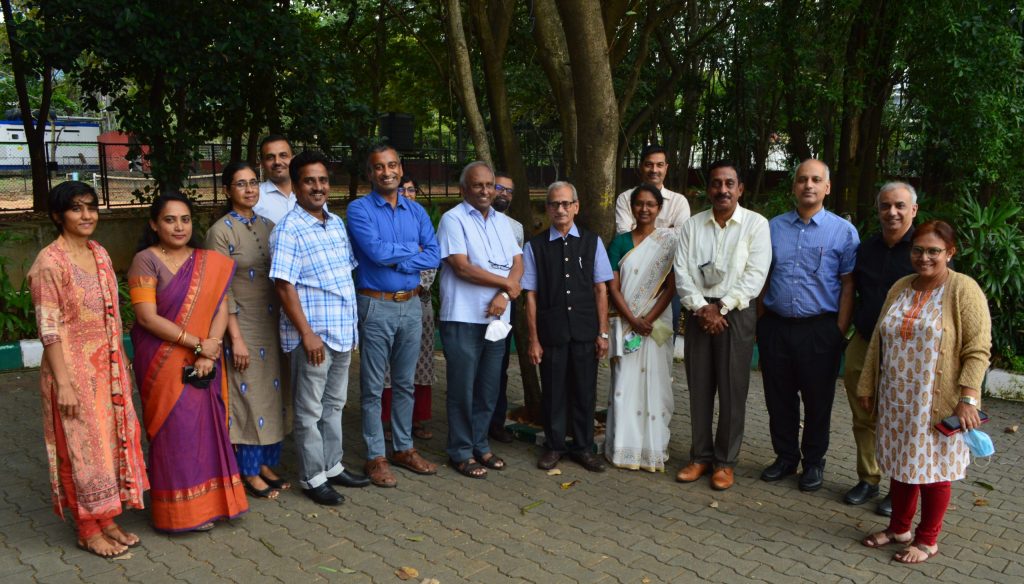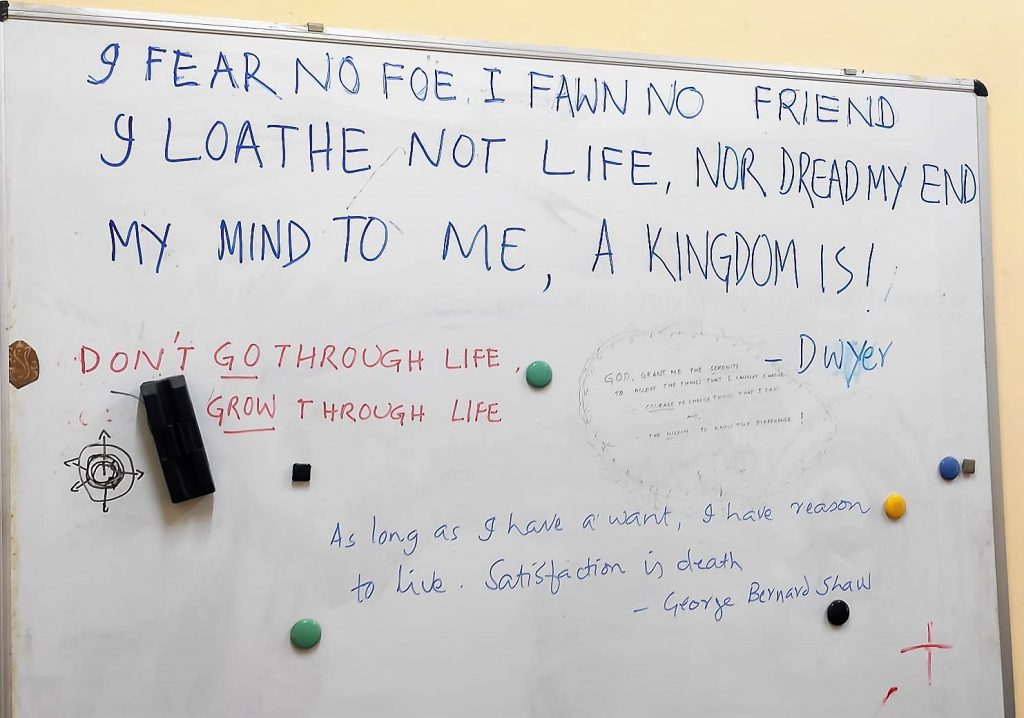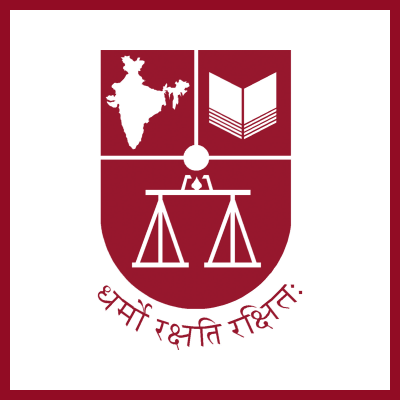Acknowledging 30 Years of Dedicated Service | Prof. (Dr.) M K Ramesh
December 7, 2021
On November 30, 2021 Prof (Dr) M K Ramesh retired after dedicating nearly 30 years of his life to NLSIU. We thank him for the years of committed service and hard work, and wish him all the best for his life ahead. In this interview, Prof Ramesh takes us through his incredibly rich career spanning over four decades, and tells us about the happy accidents that led to his association with NLS when it was still an ‘experiment in legal education’. He also reflects on his teaching-learning journey, his friendships, interests, and some rules to live life by.
About Him: Prof M K Ramesh joined NLSIU in June 1992 and also served as the University Vice-Chancellor between Aug 1, 2019 and Sep 25, 2019. He has teaching experience of over 40 years, and has worked briefly as a Commercial Tax Officer in the Government of Karnataka. His areas of specialisation include International Law, Human Rights Law, Environmental Law and Natural Resources Management Law (Land, Water, Forests, Wildlife, Biodiversity and Agriculture).
How did your NLS journey begin?
In 1984, I was part of a group of 50 teachers who were invited to attend a fortnight-long exercise by the Bar Council of India as a preparatory step in founding NLSIU. It was a rigorous exercise held right here in Hotel Kanishka, Bangalore. It was entirely organised, managed and regulated by Prof Upendra Baxi, the Director Designate of the law school, and assisted by Prof N R Madhava Menon (Founder Director of NLSIU), Prof V S Rekhi (Founder-Director of NLIU Bhopal), and Prof M L Upadhayaya. The agenda was to develop the curriculum for all non-law courses linked with the law for an institution that was to come into existence shortly (NLSIU). This formed the foundation for the curriculum which came into existence three years hence.
Hence, I knew Prof Menon and others before I actually joined the law school. It so happened that in January 1992, I came to Bangalore for a one-month teachers’ training programme. About a fortnight into this programme, Prof N L Mitra told me Prof Madhava Menon wanted to meet me. Earlier that morning, Prof Menon and I had argued on a subject where we had differing opinions and I had stuck to my ground. We eventually agreed to disagree. In fact, my co-participants in the programme told me: “You have taken on the head of the institution in an intellectual argument. Even if you’re nurturing a faint idea of joining the law school, just forget about it.”
The Invitation
Immediately after this session, I was told to meet Prof Menon. But it was a surprise to me when Prof Menon, casually eating a plantain after his lunch, suddenly asked me, “When are you joining?” Confused, I asked what he was referring to, and Prof Menon replied saying, “Law school, of course.”
I said I hadn’t thought about joining, and hadn’t even applied. “Why haven’t you applied?” was his next question. I was at Karnatak University at the time, which required a procedure to be followed before applying. And there was no way to ensure the applications would even reach on time, I said. Prof Menon immediately called for the application form and asked me to fill it up on the spot. Within half an hour, the applications were filled and a copy sent to my university as well. “Even if there is a delay in your application reaching me, we have a provision that we can invite people to join the law school,” Prof Menon had told me.
So I came to NLSIU on an invitation. I did not even plan this. In fact, my entire career hasn’t been planned. I have been fortunate that God has been very kind in providing me challenges and opportunities. And this is one such opportunity that I will cherish forever.
Once the interview took place, I served my notice period and joined NLSIU in June 1992. Many at the time told me this was a suicidal step – that I was joining a newly founded institution, and leaving behind a cozy comfortable position in a university where I could eventually be head of the institution. My only response was that I was very happy to be part of a new experiment in legal education, and that I wanted to be part of that bandwagon.
Reflections on your NLS journey over these three decades:
 The 30-year journey has been memorable in every sense of the term, for it made me realise what a teacher can do. My initial understanding in the first decade of my teaching experience was to transmit the knowledge that I have, interact with students to ensure they learn, and create an analytical atmosphere in the traditional sense of the term.
The 30-year journey has been memorable in every sense of the term, for it made me realise what a teacher can do. My initial understanding in the first decade of my teaching experience was to transmit the knowledge that I have, interact with students to ensure they learn, and create an analytical atmosphere in the traditional sense of the term.
But NLSIU was a life-changing experience for me in several ways:
(i) Empowering people
Besides imparting knowledge, I realised how a teacher could aid, guide, advise, enable, help, and empower quite a large number of people who are not equipped in the understanding of law to exercise their rights, claims and entitlements. Through several training programmes, I had a high volume of interactions with a wide variety of people from non law backgrounds. It helped me explore how a teacher could help members of the society seek and secure justice.
(ii) Teaching is learning
During the course of my career here, I realised that teaching is not just teaching, but it is learning in law. New vistas in learning open up and expand as one goes deeper into it in the classrooms. I considered the classroom a laboratory and a crucible for churning ideas of learning. Really, it was a learning experience for me – these 30 years of experimenting new ideas in the learning of law. And if at all I have achieved any stature in this field, it is mainly because of my experiments in legal education in the classroom. I can very proudly say that I’m very happy that my students were willing partners in these experiments.
In fact, I consider my students as “more than my children.” I would tell my students that my children need not obey me or follow my advice, but you unfortunate lot have to listen to me and follow whatever instructions I give you!
(iii) Capacity building in law
Another experience was of how a teacher could contribute to legal aid and capacity building in law. I recall one such wonderful experience. The Government of Karnataka thought that SC and ST communities were not represented adequately in the judiciary and requested if NLS could do something about it.
Prof Menon then summoned me to work alongside a very senior Adjunct Professor, Shankar Reddy, who was a former Prosecutor-General of Karnataka, and had a tremendous amount of practical experience. We were asked to train 20 SC and ST candidates and try to ensure that at least 5 of them would get selected for judicial positions in Karnataka. At the time, very few candidates were getting selected.
When I told Prof Menon that I knew nothing of law practice, he said I had been called for my Kannada speaking abilities to help connect with the participants. We were asked to interact with them, understand their shortcomings, design the curriculum and deliver it. It was a four-month exercise alongside my teaching job. In fact, I had my application ready for a three months’ leave to pursue my PhD. Prof Menon, however, convinced me to take up this project, and at the end of it, 12 candidates made it into the judiciary! So, I had the pleasure of helping a dozen SC/ST candidates get into judicial positions in Karnataka on merit. It was a great experience where one could help enable people to blossom into something far more effective and useful in whatever they were assigned.
Of course, it took a longer time to get my PhD! But, that was a small price to pay at the time.
(iv) Assisting with law reform:
I experienced how a teacher can aid, assist and help the state in law reform. Whether it is in terms of preparing or revising drafts of law, helping the administration perform better, or enabling the judiciary in interpreting the law better. I have witnessed and experienced all three during my three-decade NLS journey.
I have had the satisfaction of seeing many landmark judgments incorporating the teachings that I taught in the classroom. Judges have sought consultations on other counts too, such as the Environment Impact Assessment Law. In one instance, I recall Justice N K Patil consulting me on the matter of lake conservation, wherein I was asked to prepare some bullet points. These points became part of some guidelines which eventually turned out to be a legislation. In that way, there is no limit and scope for a teacher to express oneself.
A delightful journey:
Overall, it has been a delightful journey—you can become a policy intervener, a law drafter, and help in social transformation. And this experiment in legal education in law school has enabled me to do all that. I’m eternally grateful to law school for providing me that freedom and that liberty to express myself in every possible way. I will cherish these memories.
Memorable moments:
I recall, there were many challenges in terms of organising and conducting the entrance exam. We were the only national law school at the time and we had to design and apply our minds for setting the paper as there was no precedent to follow. And this became a template for all others to emulate in the years to come.
For well over a decade, I was involved in the procedures of the entrance exam, including supervising as the chairman, paper setting, and evaluating. I can tell you that in all my years of being involved in this process, the integrity of the exam was always highly maintained.
On one occasion, some powerful authorities had called, trying to influence the admission of a candidate in the law school. Despite pressure, we maintained that we have a set of markers through which we assess and select students, and the same would be applied to every candidate. The Vice-Chancellor of that time also stood by my decision. That shows the integrity of the institution.
NLS has been a rich, rewarding experience and I have a galore of much cherished memories. Time constraints won’t allow me to share everything. And frankly, I don’t think I remember everything!
On Friendships:
Except for the first 18 years of my life, Dr Ramakrishna has been a part of my life in some way or the other. We go a long way back, right to the time when both of us stood together in the queue at the Vidyavardhaka College in Mysore for admission into our Bachelors Programme. (Side note: Their roll numbers too followed one another—180 and 181 respectively.)
We then went on to do our Masters Degree at Manasagangotri in Mysore. In fact, both of us also registered for the same guide for our PhD. He was at the Mysore University before he came to NLS, where he helped teach postgraduate and PhD programmes for over 16 years. (Their guide turns out to be another NLS faculty member— Prof (Dr) H K Nagaraja.)
Prof Ramakrishna and I were allotted rooms next to each other on campus, and even turned out to be neighbours in the same residential area, without ever planning it. This bond continued throughout my time at NLS.
Looking Ahead:
This is a question for which I have no answer because it has been 43 years of a cocooned life. I have been in the comfort zone of being a teacher and sometimes feel like I do not know the external world at all. As I mentioned earlier, I don’t plan anything, nor would I plan tomorrow. The idea of retirement has still not sunk in. I’m not sure if it will ever sink in. Thanks to the pandemic and online lectures, our canvas has become wider where we don’t confine ourselves to the classroom anymore. The online and hybrid teaching model is enabling teachers to experiment with new things and reach a wider variety of audience – an audience which is willing to listen, perhaps much more than students in the classroom, who may be under compulsion to listen to us!
Another point to think about is that henceforth, I will be dictated by my wife to whom I owe everything of whatever I have achieved. And she has already laid down the first rule: No permanent regular employment in the future (he says with a chuckle). The other is not to take up an overbearing number of lectures in a day. This second rule may have been imposed for a reason. One of my researchers pointed out that I had delivered an average of 300 lectures per year, not counting the 70 hours of regular teaching per trimester.
However, I may take up lectures occasionally. And I am eagerly looking forward to new challenges.
While I did not plan on asking this question, your cheerful disposition makes me curious. What inspires you/gives you joy?
This is all due to my genes. My father (Krishnaswamy) has been my role model. He was a chief engineer in the Government of Karnataka and a pioneer in power and electrical constructions in the state. This was his advice to me:
1. You must do only that which you enjoy—in life, or in your profession.
2. You must like what you are assigned. And enjoy it.
3. You are at perfect liberty to experiment, both in life and in profession. And through all that, you must ensure that your integrity remains intact.
He lived by these rules and walked the talk. So, I don’t look beyond my father for inspiration. Of course, I commit mistakes and learn from experiences. But I am never a satisfied person. One of my favourite quotes is from Bernard Shaw: “As long as I have a want, I have a reason to live. Satisfaction is death.”

On Hobbies:
I am a literature buff and love reading classical literature. Besides this, I have developed a deep interest in Shankaracharya. Not that I have been able to decipher it. It appeals to me because it is considered to be the ultimate knowledge. I am curious.
Favourite book: It is a novella written by Richard Bach – Jonathan Livingston Seagull – which has left a lasting impression on me. It is about the expression of freedom and feeling that freedom in everything you do. It’s a short book but in the last 20 years, this has appealed to me much more than any other book.
(At NLS, Prof Ramesh is not only known for his cheerful attitude but also for giving out sweets, which he seems to always have a ready supply of. And as we finished this interview he said, “I wish I had some sweets to give to you. Unfortunately, they just cleared out my drawer a day ago and I asked them to take it all with them!)
